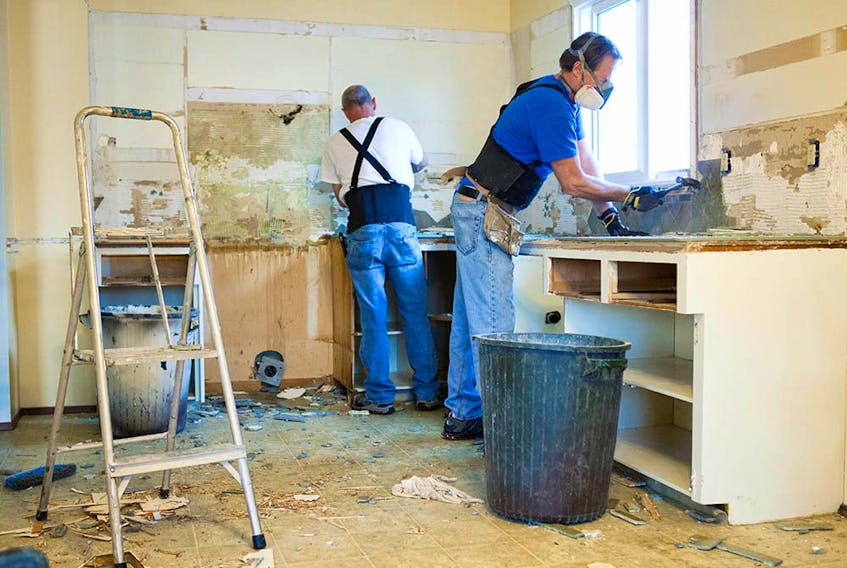Q: I retired two years ago and my son took over our family business. My wife still works part-time, teaching violin lessons from home. We downsized from a very large family home a few years ago when the last of our four kids got out on their own. Our current home is still large, but without our family under the same roof, we decided to treat ourselves. We combined one of the three upstairs bedrooms with our en suite and made a large walk-through closet. Our bedroom gained some space with the reconfiguration as well and we just love it. Now I’m thinking of closing in the carport so that I have more storage space and moving my woodworking projects to the detached garage I have in the back. My wife isn’t convinced that we should spend the money to do this. What do you think? ~James
A: Renovating your home into one that you and your spouse love is a great feeling, and with wisely planned changes, retirees can age in place longer than ever before. But when it comes to home improvement projects, there are usually more possibilities than money. Keeping costs under control, especially once you’re retired, is essential if you want to continue to enjoy your home and your golden years.
If you’ve got the know-how and energy, putting your skills to good use can help rein in your reno costs. However, living through home renovations can cause significant upheaval not just with your day-to-day living, but to your finances as well. And just when you think the dust has settled, the heavy lifting starts; it’s time to pay for the work you had done. With that in mind, here are four questions to ask yourself before undertaking major renovations once you’ve retired:
1. What are your plans for your home?
The significant costs that come with large renovations mean that you will want to plan to live in your home long enough to reap the rewards. A new patio and landscaping, reconfigured spaces for either a great room or personal retreat, closing in a carport to create a workout or hobby room, or turning a family room into an entertainment room can increase the enjoyment we get from what might be our largest single investment. That alone can make the stress and financial commitment worth it.
However, keep your overall goals in mind as you plan your renovations because some changes will make it harder to sell your home for top dollar. An odd floor plan, a reduced number of bedrooms or bathrooms, especially in what’s deemed to be a family home, or conveniences that only suit select buyers are a few such examples.
As any realtor will tell you, every home will sell if the price is right. But if you plan to downsize and use part of the sale proceeds to top up your retirement income, you’ll want to stick with doing renovations that not only appeal to you, but to most buyers as well. When the time comes, this will help ensure a good selling price.
6 Ways Debt Impacts Retirement
2. Are you protecting your investment?
When spending time with family and friends, chances are you’ve talked about some of the bigger things you’ve spent money on. Your new car, updated appliances or furniture, education for your children, anniversary jewelry for your spouse, where you went for a memorable vacation, or even new windows for your house might come to mind.
Did a new roof or hot-water tank make the list? While necessary, they aren’t typically discussion-worthy items. But what will your new vaulted ceiling look like with a big water stain from a leaky roof? Or the new flooring in the entertainment room, will it survive a flood from the hot-water tank? Before dropping a large sum of money on your renovations, make sure you’ve taken care of any repairs or maintenance that could interfere with enjoying your renovations.
Tips to Save Money When Using Major Household Appliances
3. What kind of value will the changes add?
We often think about whether or not renovations will add value to our home, but what about personally? A better space for friends and loved ones to come spend time with us, once health precautions allow for it, might achieve both: value when it comes time to sell and value for how we spend our time. But additional storage space, especially for those at a time in life when they’re downsizing, will that accomplish both as well?
Only you can answer that, of course, but before signing up to spend on storing stuff you don’t really need or want, review your plans carefully. You could ultimately be saddling your children with the responsibility of not only dealing with your affairs, but all of your stuff too. The social lock-downs of this past year have given many pause to think about how much they’re spending — on acquiring, storing, and disposing of things they thought they needed — and what they truly find meaningful.
Keep Home Renovation Costs from Breaking the Bank
4. How will you pay for the renos?
Planning new décor or envisioning how to use a new space is a lot more fun than reviewing your budget to see how you’ll afford to pay for it. If you’ve got savings set aside for home renovations, that’s always a good option. Just be sure that your circumstances still allow for the additional expense without jeopardizing your standard of living.
If you’re still paying off your last renos or have other debt you’re dealing with, it would be wise to get that taken care of before taking on more. The ability to earn more income in retirement is limited, and coupled with increased costs for health care, unexpected market fluctuations and a general rise in living costs, it makes carrying a lot of debt risky.
The goal in retirement should be to live debt-free, and if you are carrying debt, now is a good time to consider your options around how best to deal with it. Mortgage rates are still low and will put structured payments in place to take care of a large outstanding balance on a home equity line of credit (HELOC). Other forms of debt consolidation can take the pressure off and help you get on with enjoying your retirement. Just be wary of any options that erode your equity, like loans that are marketed to those with equity but not necessarily enough cash flow to keep up with payments, as well as reverse mortgages .
What to Know Before Using a HELOC
The bottom line on renovation projects when working within a retirement budget
What I think about closing in your carport isn’t nearly as important as what you and your spouse think. Sit down together and plan your project. Talk about why you’d like to do it and what her hesitations are. If it’s about the money, review your overall budget to see how much you can afford to spend and plan within that amount. If she has concerns about the work itself and its outcomes, try to arrive at a compromise. Talk to friends and family who have done similar renovation projects to gain insights you might not have thought about. If you do go ahead, incorporate a financial safety net because borrowing becomes costly or impossible when you have the assets but not the income to service the debt payments. Ultimately, it’s your castle but beware of biting off more than you can do.
Related reading:
Why Messing Up Financially Might be Good for Your Adult Kids
Time is Money – How to Use Both Wisely
Scott Hannah is president of the Credit Counselling Society, a non-profit organization. For more information about managing your money or debt, contact Scott by email , check nomoredebts.org or call 1-888-527-8999.
Copyright Postmedia Network Inc., 2021









